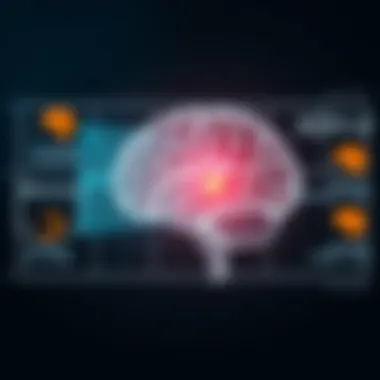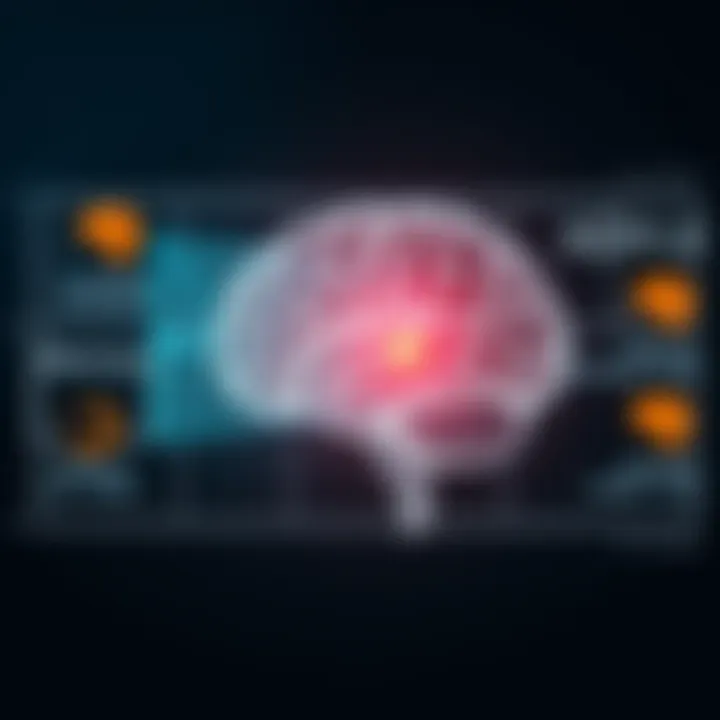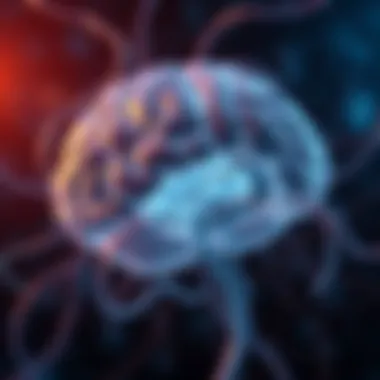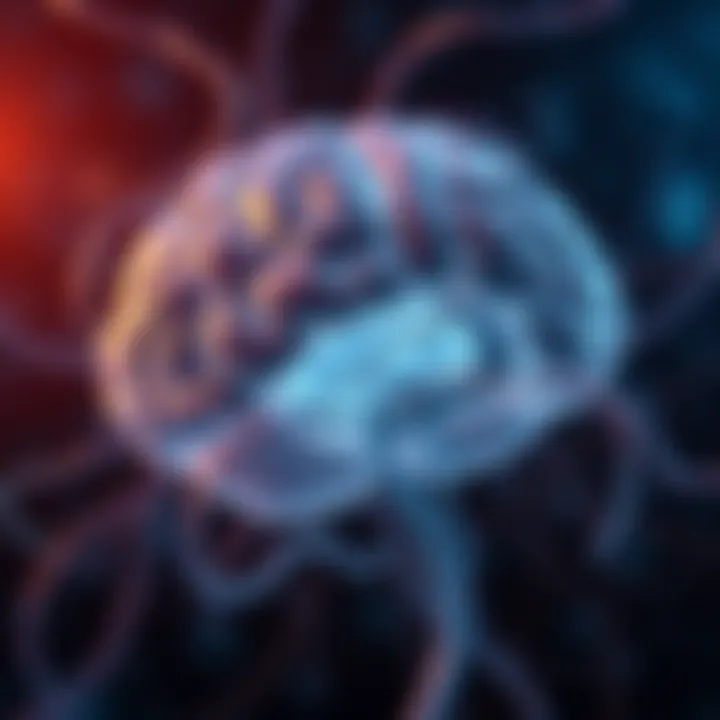Exploring How ADHD Affects Memory Function


Intro
Attention Deficit Hyperactivity Disorder (ADHD) is often misconstrued as merely a childhood phenomenon, but its shadow extends far into adulthood, affecting various facets of cognitive function, with memory being a major player. The complexity of ADHD, particularly its multifaceted interaction with memory, merits a closer examination. Individuals grappling with ADHD frequently encounter unique memory challenges which can manifest in diverse settings—including academic, professional, and social environments.
Understanding how ADHD influences memory not only sheds light on the underlying neurological dynamics but also underscores critical implications for specialized educational strategies and therapeutic interventions. In this article, we will explore the types of memory impacted by ADHD, the brain mechanisms at play, and actionable methods to support those affected. By synthesizing current research, the aim is to contribute to a clearer comprehension of how ADHD alters memory function and what can be done to assist those living with it.
Methodologies
Description of Research Techniques
Diving headfirst into the exploration of ADHD and memory, researchers deploy a variety of methodologies, each tailored to unearth specific aspects of the disorder’s impact. Most commonly, researchers utilize neuropsychological assessments, cognitive testing, and observational studies to gauge both qualitative and quantitative dimensions of memory impairment among ADHD patients.
Neuropsychological assessments often fall into two categories: standardized tests and experimental tasks. Standardized tests like the Wechsler Memory Scale measure aspects like short-term and long-term memory, while experimental tasks might include working memory challenges that track retention over time.
Cognitive testing might also hinge on tasks designed to analyze attentional control, an essential component of memory function. This interplay often shows how an inability to sustain focus can lead to lapses in memory retention.
Tools and Technologies Used
From brain imaging to behavioral analysis, the tools of the trade are just as varied as the techniques used. Advanced imaging technologies such as Functional Magnetic Resonance Imaging (fMRI) provide crucial insights into the neurological workings behind memory in those with ADHD.
These images help reveal the areas of the brain activated during specific memory tasks. On the flip side, tools such as eye trackers offer understanding into how attention correlates with memory performance in real-time.
As researchers strive to piece together this intricate puzzle, these methodologies and technologies help paint a broader picture of how ADHD influences memory function, laying the groundwork for further exploration.
Discussion
Comparison with Previous Research
Research into ADHD's impact on memory is far from new, but the nuance in findings can sometimes lead to contradictions. Early studies primarily spotlighted attention deficits, often sidelining memory issues. However, recent explorations have shifted this focus, highlighting how attention and memory are interwoven threads in the ADHD tapestry. Comparatively, this broadens the understanding of ADHD from being solely attention-centric to a more holistic view encompassing memory deficits.
Theoretical Implications
The theoretical implications arising from studying the relationship between ADHD and memory are substantial. Disruptions in memory linked to ADHD suggest a nuanced re-evaluation of cognitive models. The interplay of attentional control and memory retention indicates that interventions should harmonize these two components, emphasizing a dual approach to learning and therapy. From a theoretical standpoint, future research should focus on refining existing models to integrate these complexities for improved understanding and treatment.
In synthesis, the exploration of ADHD’s impact on memory is vital. It extends not only our knowledge of the disorder but also offers pathways to better support individuals as they navigate their unique challenges.
Understanding ADHD: An Overview
Understanding Attention Deficit Hyperactivity Disorder, commonly referred to as ADHD, is vital for grasping the intricate relationship this condition has with memory function. ADHD isn't just a childhood issue; it affects individuals across the lifespan, influencing various aspects of cognitive and emotional functioning. Understanding its core elements can assist educators, parents, and healthcare professionals in devising effective strategies for support. In this section, we delve into definitions, epidemiology, and the core symptoms of ADHD, outlining their relevance to memory and broader cognitive processes.
Defining Attention Deficit Hyperactivity Disorder
ADHD is primarily characterized by persistent patterns of inattention and/or hyperactivity-impulsivity that interfere with functioning or development. According to the DSM-5, it’s not merely about having difficulty concentrating but also encompasses areas like organization and time management. Considered a neurological disorder, ADHD origins trace back to genetic, environmental, and neurobiological factors, which play a crucial role in its manifestation. For instance, individuals might struggle with keeping their mind on tasks, often becoming easily distracted by stimuli. Understanding this definition sets the stage for recognizing how these core traits can directly impact memory function—essentially shaping various cognitive pathways.
Epidemiology and Demographics
When examining ADHD through an epidemiological lens, it becomes clear that its prevalence is significant. Studies indicate that ADHD affects approximately 5-10% of children globally, with about 2.5% of adults harboring the condition. Interestingly, boys are diagnosed more frequently than girls, with a ratio that can be as high as 3:1. However, this disparity might stem from the way symptoms present differently between genders.
Research also points to environmental factors such as prenatal exposure to toxins or maternal stress, which can contribute to higher rates of diagnosis. Understanding the demographics and broader patterns of ADHD is essential for educators and researchers alike, as it emphasizes the need for targeted interventions and support systems tailored to diverse populations.
Core Symptoms of ADHD
Core symptoms of ADHD can broadly be classified into two categories: inattention and hyperactivity-impulsivity.
- Inattention: Individuals may find it challenging to sustain attention in tasks, follow through on instructions, or organize activities. This often extends beyond just academic tasks—home responsibilities may also suffer.
- Hyperactivity-Impulsivity: This facet manifests as fidgeting, restlessness, or an inability to wait for one’s turn. These behaviors can disrupt social interactions and classroom environments significantly.
The overlap between these symptoms and memory function is profound. Individuals with ADHD frequently report difficulties in retaining information, managing tasks, and organizing thoughts, which can hinder academic performance and everyday functioning. By gaining a comprehensive understanding of the symptoms, we can deepen our insights into how ADHD challenges memory capabilities.
"ADHD is not just a deficit of attention; it's a complex condition that entails various cognitive dysfunctions affecting daily life experiences."
Memory Types and Their Functions
Understanding the different types of memory is crucial when discussing Attention Deficit Hyperactivity Disorder (ADHD) and its impact on cognitive function. Memory isn't just one solid block; it's more like a flexible toolbox with various compartments, each serving a distinct purpose. In this section, we will explore the characteristics of short-term memory, the mechanisms of long-term memory, and the definition of working memory, illuminating how each type plays a vital role in our daily experiences.


Short-term Memory Characteristics
Short-term memory, often referred to as working memory, is the mental scratchpad where we hold information temporarily. This type of memory typically has a limited capacity, allowing us to retain about seven chunks of information for roughly 15 to 30 seconds. For individuals with ADHD, short-term memory can feel like trying to hold water in a sieve—some bits may slip through unnoticed.
Characteristics of Short-term Memory:
- Limited duration: Information here doesn’t stick around long; without reinforcement, it dissipates quickly.
- Capacity constraints: The magical number seven plus or minus two seems to apply—too much input can lead to cognitive overload.
- Active processing: Short-term memory involves manipulating information, making it integral for tasks like problem-solving, reading comprehension, or even having a conversation.
People with ADHD may struggle with various facets of short-term memory, including recall and retention, which can impede tasks requiring multi-step processes or following verbal instructions.
Long-term Memory and Its Mechanisms
Long-term memory, as the name suggests, allows us to store information over extended periods, sometimes even for a lifetime. It's where our personal narratives, learned skills, and factual knowledge reside. However, how long-term memories are formed can vary widely.
Mechanisms Involved in Long-term Memory:
- Encoding: The initial step where information is transformed into a format suitable for storage. This involves attention and effort, which can be challenging for people with ADHD.
- Storage: This is where memories are kept, often grouped by relevance or similarity. In ADHD, disorganized storage can lead to difficulty retrieving these memories later.
- Retrieval: The process of accessing stored information. Those with ADHD may find returning to past experiences or learned material particularly difficult due to distractibility and a less structured retrieval approach.
People with ADHD frequently exhibit long-term memory issues. They might remember some aspects of an event while completely overlooking others. This selective recall can be a stumbling block in academic and professional settings.
Working Memory: Definition and Importance
Working memory is like a mental workspace where information is temporarily held for manipulation. It’s not only crucial for holding information but also for integrating it with other knowledge. The role of working memory can’t be understated, especially for individuals with ADHD, who may face significant challenges in this area.
Key Points About Working Memory:
- Integration of information: Working memory lets us keep chunks of info ready for mental operations, like solving math problems or planning meals.
- Attention dependency: It’s heavily influenced by our ability to focus. Distractions can severely hinder function, which is often the case for individuals with ADHD.
- Developmental variations: Working memory capacity generally improves with age, yet children and adolescents with ADHD often lag behind.
The implications of working memory challenges are far-reaching, affecting learning strategies, task completion, and even social interactions. For educators and professionals, understanding these memory types offers great insight into tailored strategies for supporting individuals with ADHD.
"Understanding memory types not only sheds light on the struggles of individuals with ADHD but also illuminates pathways to effective intervention strategies."
By breaking down the components of memory, we gain valuable perspectives on how to address the challenges that ADHD presents. It’s a stepping stone to developing practical support that can boost retention, understanding, and overall academic performance.
The Relationship Between ADHD and Memory
Understanding the relationship between ADHD and memory function is crucial for grasping the full scope of how this condition affects individuals. Those with ADHD often grapple with various types of memory deficits, making it essential to differentiate between these deficits and consider their implications for daily life. This topic is not just an academic exercise; rather, recognizing the nuances can significantly influence educational strategies and therapeutic practices.
Memory is not a monolithic concept; it encompasses various types such as short-term, long-term, and working memory, each having unique characteristics and functions. In individuals with ADHD, memory deficits can manifest in diverse ways, impacting their ability to learn, socialize, and perform academically. These memory challenges stem from a combination of neurological mechanisms and cognitive processes that entwine in a complex web.
Memory Deficits Common in ADHD
Individuals diagnosed with ADHD often exhibit specific memory deficits. Research suggests that short-term memory is one of the more noticeably affected areas. This can translate to difficulties in retaining information needed for immediate tasks, such as remembering instructions provided by a teacher or a conversation from earlier in the day. Moreover, these individuals may find themselves forgetting items needed for class or other important activities without adequate external reminders.
- Common memory deficits include:
- Difficulty retaining new information
- Struggles recalling facts or details from recent lessons
- Challenges organizing and managing personal belongings
Working Memory Challenges
Working memory is a pivotal component for performing tasks that require manipulation of information in real-time. For students with ADHD, challenges here can be even more pronounced. Research indicates that many face hurdles when asked to manage multiple pieces of information simultaneously. For example, trying to solve a math problem while also recalling multiplication facts can become a mountain too steep to climb. On a broader scale, these working memory challenges severely limit their ability to engage with complex tasks requiring sustained mental effort and focus.
Factors contributing to these working memory challenges often involve open distractions in the environment, potentially exacerbating difficulties in concentration and cognitive load. It becomes clear how impactful refining working memory strategies can be in supporting individuals with ADHD. It’s not just about having a good memory; it's about how memory interacts with overall cognitive function.
Impact on Learning and Academic Performance
The profound impact of memory deficits in ADHD on learning outcomes cannot be overstated. When memory function falters, the ripple effects extend beyond personal frustration to encompass academic performance and social relationships. Students may struggle with comprehension and retention, leading to a less favorable outlook on learning and self-worth.
- Key impacts on academic performance include:
- Decreased ability to absorb new material during lessons
- Struggles with task completion and following through on assignments
- Potential for lower grades, further contributing to a cycle of dissatisfaction and disengagement
Navigating these memory challenges in an academic setting highlights the need for tailored interventions that consider the individual’s unique struggles with memory. Educators, while facing the reality of these challenges, are positioned to introduce strategic adjustments—like breaking tasks into smaller segments or offering alternative forms of instruction—that can assist students in overcoming these hurdles.
"When memory issues are not addressed, the long-term consequences can lead to a diminished academic experience and a lack of confidence that plagues students long after they’ve left the classroom."


Neurological Mechanisms Behind Memory Issues
Understanding the neurological underpinnings of memory issues in individuals with ADHD offers vital insights into the broader implications of the disorder. Memory isn’t just about recalling facts or remembering appointments; it intertwines with attention, focus, and even emotional regulation. The relationship between ADHD and memory function highlights the complexities of cognitive processes at a neurobiological level. The more we grasp these mechanisms, the better positioned we become to devise effective strategies for support and intervention.
Brain Structures Associated with Memory
The brain is an intricate web of structures that work in harmony to facilitate various functions, including memory. Key players in this narrative are the hippocampus, prefrontal cortex, and amygdala. Each of these structures serves a distinct role yet operates collaboratively to shape our memory experience.
- Hippocampus: Often hailed as the hub for memory formation, it is indispensable for converting short-term memories into long-lasting ones. In individuals with ADHD, abnormalities in the hippocampus have been noted, impacting their ability to retain and recall information.
- Prefrontal Cortex: This area is crucial when it comes to higher-order cognitive functions, including working memory and decision-making. Those with ADHD tend to show irregularities in this region, which can lead to challenges not just in memory but also in organizing thoughts and executing tasks.
- Amygdala: While primarily associated with emotional processing, the amygdala’s connection to memory is profound. It helps encode emotional memories and can affect how we remember events based on their emotional weight. ADHD can skew these connections, leading to atypical emotional responses during memory recall.
"Neuroscience illuminates the delicate dance between attention and memory – a choreography often disrupted in ADHD."
Neurotransmitters and Their Role
Neurotransmitters are the brain's chemical messengers, and their balance is crucial for optimal cognitive functioning. In ADHD, two main neurotransmitters frequently come into focus: dopamine and norepinephrine.
- Dopamine: This neurotransmitter plays a significant role in motivation, pleasure, and reward. An imbalance can profoundly affect attention and memory encoding. Many studies indicate individuals with ADHD often have lower dopamine levels, particularly in areas relevant to memory. This deficiency can result in difficulty sustaining attention, which then impacts memory retention.
- Norepinephrine: This neurotransmitter is linked to arousal and alertness. Fluctuations in norepinephrine levels can influence attentional focus and enhance or impair memory retrieval processes. Combined, these neurotransmitter irregularities can lead individuals with ADHD to experience fragmented memory functioning and reduced efficacy in recalling information.
Cognitive Load and Attention Processes
Cognitive load refers to the total amount of mental effort being used in the working memory at any given time. In individuals with ADHD, managing cognitive load can be particularly challenging due to their attentional deficits.
When there’s a high cognitive load, the brain struggles to allocate resources effectively, especially in a chaotic environment full of distractions. Key points to note include:
- Increased Cognitive Demand: Individuals with ADHD may find it harder to juggle multiple tasks or absorb extensive information without becoming overwhelmed. This often leads to memory failures as the brain's bandwidth runs short.
- Attention Distribution: For those with ADHD, sustaining attention can be akin to herding cats. The inability to filter out distractions affects not only focus but also how memories are processed and stored. When attention is fragmented, the likelihood of creating stable memories diminishes.
The exploration of these views on neurological mechanisms solidifies our understanding of the interplay between ADHD and memory, setting the groundwork for further research and intervention strategies.
Assessment Approaches for Memory Function in ADHD
Assessing memory function in individuals with ADHD is pivotal for understanding how the disorder impacts learning and daily life. The evaluation processes not only help in identifying specific memory deficits but also guide educators and mental health professionals in crafting personalized strategies that enhance learning and coping mechanisms. Establishing a robust assessment framework can lead to more informed interventions and ultimately improve the quality of life for those affected by the disorder.
Standardized Tests for Memory Evaluation
Standardized tests play a significant role in assessing memory function among individuals with ADHD. These tests provide a structured, objective way to measure various aspects of memory, including short-term recall and long-term retention. For instance, the Wechsler Memory Scale is commonly used to assess different memory domains like verbal and visual memory. This type of assessment not only highlights specific areas where a student might struggle but also compares their performance to normative data, which can be enlightening for both educators and parents.
Moreover, these tests can uncover patterns that might otherwise go unnoticed. For example, some students may excel in visual memory while faltering in verbal tasks, or vice versa. Understanding these nuances can lead to tailored educational strategies. The results from such evaluations remain crucial for developing effective intervention plans.
Behavioral Assessments
Behavioral assessments involve collecting data on how an individual behaves in various situations that demand memory use. This qualitative approach can reveal real-world memory challenges that standardized tests might not capture. Teachers and caregivers often collaborate to monitor behaviors over time using checklists and observational methods.
These assessments are beneficial because they provide context to the memory issues. For example, a child exhibiting difficulties remembering instructions during a busy classroom setting may be facing challenges related to attention as much as memory capacity. Such insights can help in identifying environmental factors that exacerbate memory deficits.
Understanding behavioral dynamics can lead to significant improvements in memory strategy applications. By focusing on particular contexts where memory falters, adjustments can be made promptly, making learning more accessible.
Neuropsychological Evaluations
Neuropsychological evaluations bring an in-depth understanding of how ADHD specifically affects memory functions. These assessments employ a battery of tests designed to evaluate cognitive functions systematically. They often probe for underlying neurological issues that could be impacting memory. Through these evaluations, professionals can ascertain the extent and nature of memory deficits, distinguishing whether problems arise from processing issues, retrieval difficulties, or attention constraints.
An experienced neuropsychologist may employ tests that directly assess working memory, such as the Digit Span task or the Wisconsin Card Sorting Test. These tests not only identify deficits but also help clarify whether the individual’s memory issues stem from broader cognitive challenges.
Ultimately, evaluating memory functions through these various approaches leads to a comprehensive understanding of the interaction between ADHD and cognitive processes. Accurate assessments pave the way for interventions—be it through cognitive-behavioral techniques, educational accommodations, or therapeutic supports—tailored to the unique profile of the individual.
By examining memory function holistically, practitioners can offer strategies that resonate with the individual's needs, fostering improved outcomes both academically and socially.
Strategies for Enhancing Memory in Individuals with ADHD
In the journey of understanding ADHD, one must recognize the vital importance of strategies aimed at enhancing memory for individuals diagnosed with this condition. Memory challenges are a common feature of ADHD, impacting academic performance, daily functioning, and overall self-esteem. It becomes essential to focus on effective strategies that can aid these individuals in overcoming memory deficits, thus fostering a sense of accomplishment and improving their quality of life.
Implementing targeted interventions can have significant benefits. Not only do these strategies promote better memory retention, but they also provide patterns of support that individuals with ADHD can rely on. As we delve deeper into the specific elements, we see that the correct use of cognitive behavioral techniques, tailored educational interventions, and technological tools can yield transformative results.
Cognitive Behavioral Techniques
Cognitive Behavioral Techniques (CBT) play a pivotal role in enhancing memory for those with ADHD. These methods are not just about improving cognitive function; they also tackle the emotional and behavioral aspects of the disorder. By fostering awareness of one’s thought patterns, individuals can learn to manage distractions more effectively.


- Goal Setting: A clear set of achievable goals can serve as a roadmap for memory improvement. Small, incremental objectives give a sense of progress and reward.
- Mindfulness Practices: Techniques like meditation or focused breathing can help center the mind, reducing the mental noise that often interferes with memory tasks.
- Cognitive Restructuring: This involves recognizing negative thought patterns that inhibit memory function and replacing them with more constructive, positive thoughts.
Ultimately, CBT equips individuals with tools to better navigate their day-to-day lives, offering not just memory support but also a broader framework for personal growth.
Educational Interventions
Educational settings offer a fertile ground for the implementation of memory-enhancing strategies. Tailored educational interventions can make a world of difference for students with ADHD.
- Structured Learning Environments: A consistent and organized approach to education allows these individuals to thrive. Regular routines and clear expectations minimize distractions and foster better focus.
- Multisensory Techniques: Engaging multiple senses—visual, auditory, and kinesthetic—touches different memory pathways. Techniques like using infographics, audio recordings, or hands-on activities cater to diverse learning styles.
- Repetitive Learning: The power of repetition cannot be understated. Repeating information through various methods, such as drills or spaced learning, can cement knowledge more effectively in memory.
Teachers and educational staff should leverage these strategies, providing an environment conducive to memory enhancement and supporting ADHD students to realize their academic potential.
Technological Aids for Memory Support
In our tech-driven world, leveraging technology can bring significant benefits for enhancing memory in individuals with ADHD. Multiple tools and applications available today cater specifically to the needs of those struggling with memory retention.
- Digital Reminders: Utilizing apps like Google Calendar or to-do list apps helps individuals schedule tasks and deadlines efficiently. Setting reminders for specific actions is key to overcoming forgetfulness.
- Note-taking Software: Tools such as Evernote allow individuals to capture and organize thoughts quickly. The ease of accessing and sharing these notes enhances collaborative learning.
- Gamified Learning Platforms: Many educational platforms incorporate games into their learning techniques, making memory retention more enjoyable and engaging. This approach is especially beneficial for children who might find traditional studying boring.
By incorporating these technological aids into their everyday routines, individuals with ADHD can improve their memory function while also making daily tasks more manageable.
"Memory is a strange thing. It's not like a tape recorder that plays back exactly what’s been said. Rather, it’s more like a puzzle piece that can easily be misplaced."
In summary, while ADHD presents its unique memory challenges, targeted strategies can offer substantial support. Cognitive behavioral techniques, tailored educational interventions, and technological tools all stand as pillars for enhancing memory in individuals with ADHD. These approaches not only help improve immediate memory function but also contribute to a greater overall sense of accomplishment and well-being.
Future Directions in ADHD Research
The quest to understand ADHD’s influence on memory function is far from done. As research evolves, new frontiers beckon. Continuing exploration in ADHD research presents not just opportunities, but essential pathways that can redefine how we view cognitive challenges linked to this condition.
Emerging Trends in Neurobiology
Recent studies have begun to highlight subtle changes in brain architecture associated with ADHD. Notably, advancements in neuroimaging techniques have unveiled fascinating insights into the neural circuits that underpin memory processes in individuals with ADHD. For instance, researchers have noted alterations in the connectivity of the prefrontal cortex with other brain regions involved in memory.
These discoveries hint that ADHD is more than a straightforward deficit but rather a complex interplay of neurobiological factors. Focusing on these changes can lead to innovative approaches that tailor interventions based on individual neurobiological profiles. This deeper understanding of how memory mechanisms are affected can pave the way for custom-designed therapies aimed at remediating specific cognitive deficits. Alongside this, it fuels future studies into how different neurobiological trends manifest across populations, thus enriching our understanding of ADHD in diverse contexts.
Potential Therapeutic Innovations
The landscape of ADHD treatment may see significant transformations with the advent of potential therapeutic innovations. Consider the rise of neuromodulation techniques, such as transcranial magnetic stimulation (TMS) and neurofeedback, which are showing promise in alleviating some of the cognitive symptoms associated with ADHD. Standard treatments focus mainly on medication, yet these new modalities could offer complementary avenues for enhancing memory function and attention spans.
Further advances in pharmacology might result from enhanced understanding of neurotransmitter pathways. For instance, if we can pinpoint exactly how dopamine and norepinephrine interact with memory systems in ADHD, targeted drugs could emerge, tailored to improve memory processing without side effects. This highlights an overarching need for multifaceted strategies, which could blend behavioral therapies with novel pharmacological solutions.
Longitudinal Studies on Memory and ADHD
Longitudinal studies serve as a cornerstone to comprehensively grasp the evolving nature of ADHD and its impact on memory. By tracking individuals over extended periods, researchers can capture data that depict how memory deficits change from childhood into adulthood. This long-term view might unveil patterns and nuances that short-term studies simply cannot.
These studies also lend insight into how various factors, such as environmental influences, educational interventions, and therapeutic strategies, interact over time to shape memory function. For example, examining the effects of cognitive behavioral interventions over several months could yield invaluable data on their effectiveness in improving memory capacity for individuals with ADHD. Furthermore, by identifying critical milestones and periods of cognitive development, such studies can guide future research priorities and treatment protocols.
"The complexity of ADHD requires a nuanced understanding of its multifaceted impacts on cognition, particularly memory. As researchers peel back the layers, they generate an informed foundation for both therapeutic practices and educational strategies."
Integrating findings from longitudinal studies into clinical practices will be essential for clinicians, educators, and researchers alike. By shaping interventions based on a richer understanding of memory-related pathways, professionals stand to enhance the quality of life for those affected by ADHD more effectively than ever before.
Consider exploring more on this topic through networks like Wikipedia on ADHD, or professional educational resources available at platforms like Britannica for additional context.
Closure
In this closing segment, we bring together the essential threads woven throughout the exploration of ADHD’s impact on memory function. Understanding how ADHD manifests and influences memory is crucial not only for those diagnosed but also for educators, healthcare professionals, and researchers. With the nuances that ADHD introduces to memory processes, it becomes apparent that managing this condition requires a multifaceted approach.
Summarizing the Impact on Memory Function
Memory deficits in individuals with ADHD often manifest in various ways. Short-term memory might seem fleeting, like trying to catch water with cupped hands. Many individuals struggle with retaining new information, leading to frustrations in learning environments. Long-term memory, while potentially more robust, can be impaired by the challenges of encoding or retrieving information when it’s needed, making academic performance and daily tasks tougher.
Working memory is frequently highlighted as a significant area of concern. It serves as a mental workspace that allows individuals to hold onto information temporarily for immediate use. When working memory is compromised, one may forget instructions just moments after hearing them, impacting everything from classroom learning to personal organization. This leads to repetitive cycles of frustration and diminished self-esteem.
In educational settings, this has broad implications, suggesting the necessity for tailored interventions that recognize the unique needs of students with ADHD. Because traditional methods of instruction may not reach or resonate with these students, new techniques, strategies, or technologies need to be employed to help bridge gaps in memory function.
The Importance of Continued Research
As we conclude our exploration, one cannot stress enough the importance of ongoing research into the interplay between ADHD and memory. Despite significant advances in understanding, numerous questions remain unanswered—particularly regarding effective interventions and accommodations for those affected by ADHD. Continuous investigation into ADHD’s neurobiology and its cognitive implications can lead to advancements in clinical practices, enhancing the quality of life for individuals dealing with this challenge.
In addition, this research can also illuminate potential connections between ADHD and other cognitive functions that are still under-explored. As the landscape of ADHD continues to evolve, so too should our strategies for supporting individuals. We should aim not only to address the symptoms but also to empower individuals with tools that promote their cognitive strengths, paving the way for more effective treatments and enhanced educational policies.
In summary, recognizing ADHD’s impact on memory is a vital step toward promoting a better understanding of this disorder. It calls for a sustained effort to innovate educational practices and therapeutic approaches that truly address the challenges faced by individuals with ADHD.



